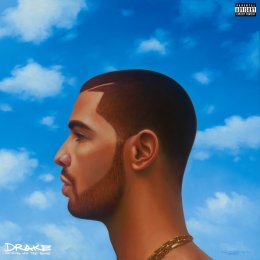
![]()
This post is in partnership with Consequence of Sound, an online music publication devoted to the ever growing and always thriving worldwide music scene.
“I’ve never been part of a year when so many legends are dropping projects,” Drake lamented in a recent XXL cover story. “How am I going to be seen?” The half-jewish, half-African American MC is not only aware of his competition, he’s out-and-out scared of them. And who wouldn’t be? With Kanye West proclaiming himself “the Steve Jobs of culture,” and Jay Z rolling with multi-billion dollar media conglomerates, that’d be enough to make a sane rapper recede back into the shadows to brood. But, the thing is, that opaque, champagne-laced place is exactly where Drake lives. Over the last five years, he’s slowly and surely been ushering virtually the entire rap game with him into this world. On “Tuscan Leather”, the opening track from his third LP, Nothing Was the Same, he says he’s “on a mission trying to shift the culture.” And, if an impressive 10 Hip-Hop/R&B No. 1 singles are any indication, this Canadian former child actor is doing a pretty damn good job.
Still, there’s a lot riding on Nothing Was the Same. It’s so easy to crack wise about Drake’s cushy, sensitive guy image (Don’t believe me? Do a quick Twitter search for “Drake crying”). He’s the antithesis of everything we’ve come to expect from our rap superstars over the last 30 years. He drunk dials his ex at 4:00 a.m., prefers making love to f*cking, and can’t stop ruminating over age-old breakups with Hooters waitresses named Courtney. Drake is far from the first rapper to brandish his heart on his sleeve, but he is the first to craft an entire persona around this concept. What makes him so appealing and this album so unequivocally successful is that behind his tortured soul there’s a perceptible and refreshing humanity to everything he does. While Yeezy sets his sights on uber-aggressive polarization and Hova hawks cell phones, Nothing Was the Same is essentially an album of bedroom confessionals with a million dollar budget. Drake isn’t a monolith of culture beyond all reproach; he’s a regular guy who hasn’t quite figured his life out yet.
He’s getting there, though. 2011’s phenomenal Take Care showed Drake alone and dejected in his gold-plated mansion; on Nothing Was the Same, not only is his chin up, it’s in the clouds. On all-hook–no-filler single “Started From The Bottom,” he raps, “say I wasn’t hungry, never struggled, yeah I doubt it nigga.” He’s addressing his most common criticism head-on—yes, his past consisted of middle class suburbia and plush television sets, but just because he wasn’t slinging crack on ghetto corners doesn’t make his journey and tribulations any less valid.
The streets come up again on “Wu-Tang Forever,” where amidst some of Drake’s most poised rhyming to date, he confesses, “I find peace knowing that it’s harder in the streets, I know. Luckily I didn’t have to grow there, I would only go there ‘cause there’s niggas that I know there.” The audacity for one of the biggest names in hip-hop to so explicitly lay out that he’s not from the block is striking, the fact that he does it with such machine gun precision and skill is a revelation.
(MORE: Fall 2013 Music Preview)
“Hold On, We’re Going Home” is the album’s emotional centerpiece. In a croon that’d give Marvin Gaye chills, Drake assures, “I want your hot love and emotion, endlessly.” There’s no rapping at all here, and Drake’s singing has never sounded better. It’s equal parts bleary-eyed anthem for every girl who’s ever left a club alone at last call and bottom-lip-biting R&B banger. Is he just trying to get into your pants before the end of the night? Probably. But you’re going to cry on each other’s shoulders first and feel better about your problems the next morning.
Drake’s usual partner in crime, Noah “40” Shebib deserves much of the credit for Nothing Was the Same’s seamlessness. Some songs come equipped with two-minute outros and reprises, while others bleed into each other. In lesser hands it could’ve turned into a disorganized hodgepodge, but the album plays like a neatly pieced together puzzle. The arc comes to a close with “Pound Cake,” which also features the only A-list guest spot on the entire record, courtesy of Jay Z. It’s the sequel to Thank Me Later’s “Light Up,” but the contrast between the two tracks couldn’t be more stark. Where the living legend once offered sage advice to a rookie, this time he comes off like a dorky dad knocking on his son’s bedroom door (low moment: Jay rhymes “cake” with “cake” eight lines in a row). It’s here, standing shoulder to shoulder with giants, where it’s easiest to see how much Drake’s craft has improved since he broke onto the scene. He doesn’t need to lean on another MC; he’s honed his game to the point where he can make even one of the most decorated rappers look like a second-rate schlub.
At this moment, one of rap’s hottest talents is a guy who’d rather read you his diary than his bank statement. Nothing Was the Same wrestles Drake’s successes with his ever-lingering insecurities, and like some of the best music, we can see ourselves in these songs. It’s an exhilarating change of pace for the genre. Now pass the tissues.
Essential Tracks: “Tuscan Leather”, “Hold On, We’re Going Home”, and “Started From The Bottom”
More from Consequence of Sound: The Odds of a Kinks Reunion Just Went to 50/50
More from Consequence of Sound: Watch Pearl Jam’s Short Film Featuring Judd Apatow
